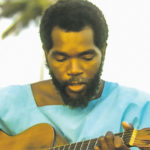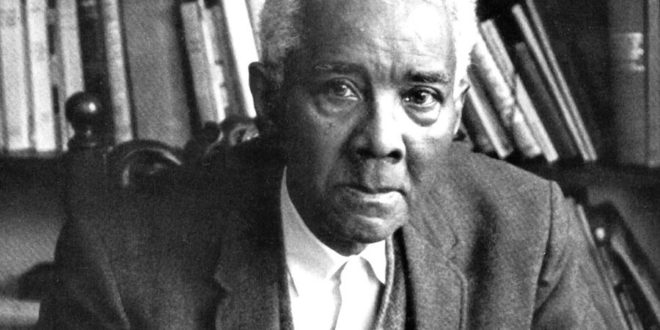Podcast: Play in new window | Download (Duration: 58:05 — 43.2MB)
 Best known for his path-breaking work on the Haitian Revolution, The Black Jacobins, published in 1938, Trinidadian C.L.R. James was often at the center of revolutionary politics and theory in the 20th century; a one-time Trotskyist and fully informed by a study of Marx, James’s greatest work extends from beyond the boundaries of politics and reaches into an attention to and analysis of pop culture as it reveals the workings of our social order: from his insightful study of Melville’s Moby Dick to his becoming one of the premier sports writers of his age through his writing on (and love for) cricket, as well as his fascination with movies and television. Scratch the surface of any important thinking from the 1930s through the late 70s and you will find James has been there and influenced so many that came after him.
Best known for his path-breaking work on the Haitian Revolution, The Black Jacobins, published in 1938, Trinidadian C.L.R. James was often at the center of revolutionary politics and theory in the 20th century; a one-time Trotskyist and fully informed by a study of Marx, James’s greatest work extends from beyond the boundaries of politics and reaches into an attention to and analysis of pop culture as it reveals the workings of our social order: from his insightful study of Melville’s Moby Dick to his becoming one of the premier sports writers of his age through his writing on (and love for) cricket, as well as his fascination with movies and television. Scratch the surface of any important thinking from the 1930s through the late 70s and you will find James has been there and influenced so many that came after him.
“Property-owners are the most energetic flag-waggers and patriots in every country, but only so long as they enjoy their possessions: to safeguard those they desert God, King and Country in a twinkling.”
― C.L.R. James, The Black Jacobins: Toussaint L’Ouverture and the San Domingo Revolution
 SEGMENT ONE
SEGMENT ONE
We’ll first hear from Paul Buhle on the life of C.L.R. James. In 1967, Buhle, along with his wife Mari Jo, founded and edited the journal Radical America. And it was through Radical America that James was “reintroduced” to the Left. An entire issue was dedicated to James in 1970 creating the first anthology of his work to be published in the US. In our conversation Buhle demonstrates the depth and breadth of James’s writing noting especially how his work draws attention to the ways racism and class struggle are deliberately entangled. We begin in Trinidad with the Young C.L.R. James.
 SEGMENT TWO
SEGMENT TWO
Paul Le Blanc charts the intellectual course for us showing the importance of Marx and Trotsky in James’s work; he also details the era’s socialist factionalism. Along with Raya Dunayevskaya and Grace Lee Boggs, James was a founder of the Johnson-Forest Tendency, a radical left tendency in the United States that focused on black activism and held that the Soviet Union under Stalin was state capitalist, not a bureaucratic collective.
 SEGMENT THREE
SEGMENT THREE
Law Ware shares with us a personal response to James as an exemplar of the black intellectual, proof to Ware that he could follow that path also. Of course, Ware notes, James isn’t perfect, showing little regard for women in his work (even though women were his greatest collaborators).
GUESTS
Paul Buhle is the author of C.L.R. James: The Artist as Revolutionary (Verso). He is one of the foremost historians of American Radicalism and the American Left having authored or edited over 30 books, including works such as Images of American Radicalism, Marxism in the United States, The Encyclopedia of the American Left, and Radical Hollywood. He is also the editor of 12 comic art books that are wide-ranging yet consistent in Socialist and Radical perspective: There are books on Jesus, Lincoln, The Beats, Bohemians, The Wobblies, Rosa Luxemburg and most recently on the Irish martyr James Connolly who was executed by the British for his role in the Easter Uprising of 1916.
Paul Le Blanc is an historian and activist. He’s a Professor of History at La Roche College in Pittsburgh whose most recent books are October Song: Bolshevik Triumph, Communist Tragedy, 1917-1924, and Left Americana: The Radical Heart of US History, both published by Haymarket, and author of Choice Award–winning book A Freedom Budget for All Americans.
Lawrence Ware is co-director of the Africana Studies Program and Teaching Assistant Professor and Diversity Coordinator in the Department of Philosophy. He is a contributing writer to Slate Magazine, The New York Times and The Root. He has been a commentator on race and politics for the Huffington Post Live, NPR, and TV One. Lawrence has taught and lectured across the country on issues ranging from race to economic policy. He organizes the Critical Conversations series, which hosts a number of events on campus related to race, gender, and religion.
RELATED
Why Negroes Should Oppose the War by C. L. R. James (1939)
The Neglected C.L.R. James by Paul Buhle
The Missing Gospel of CLR James by Paul Buhle and Lawrence Ware
The Marxism of C.L.R. James by Paul Le Blanc
Interview with Paul Le Blanc on The Revolutionary Experience (MR Online)
Cedric Robinson, Author of Black Marxism, Died This Month to Little Fanfare, but Not Before He Changed My Life by Lawrence Ware
Interview with Paul Buhle on Radical America
INTERCHANGE
Leon Trotsky, or The Revolution Betrayed (Paul Le Blanc)
The Graphically Radical Paul Buhle
 MUSIC
MUSIC
“Calypso Jazz Improvisation” by The Steel Band Of Trinidad
“Make Life Easy On Me” by Lancelot Layne
“Yo Tink It Sorf” by Lancelot Layne
“Chant” by Lancelot Layne
CREDITS
Producer & Host: Doug Storm
Edited by Rob Schoon and Bryce Martin
Executive Producer: Wes Martin
 WFHB Bloomington Community Radio
WFHB Bloomington Community Radio


